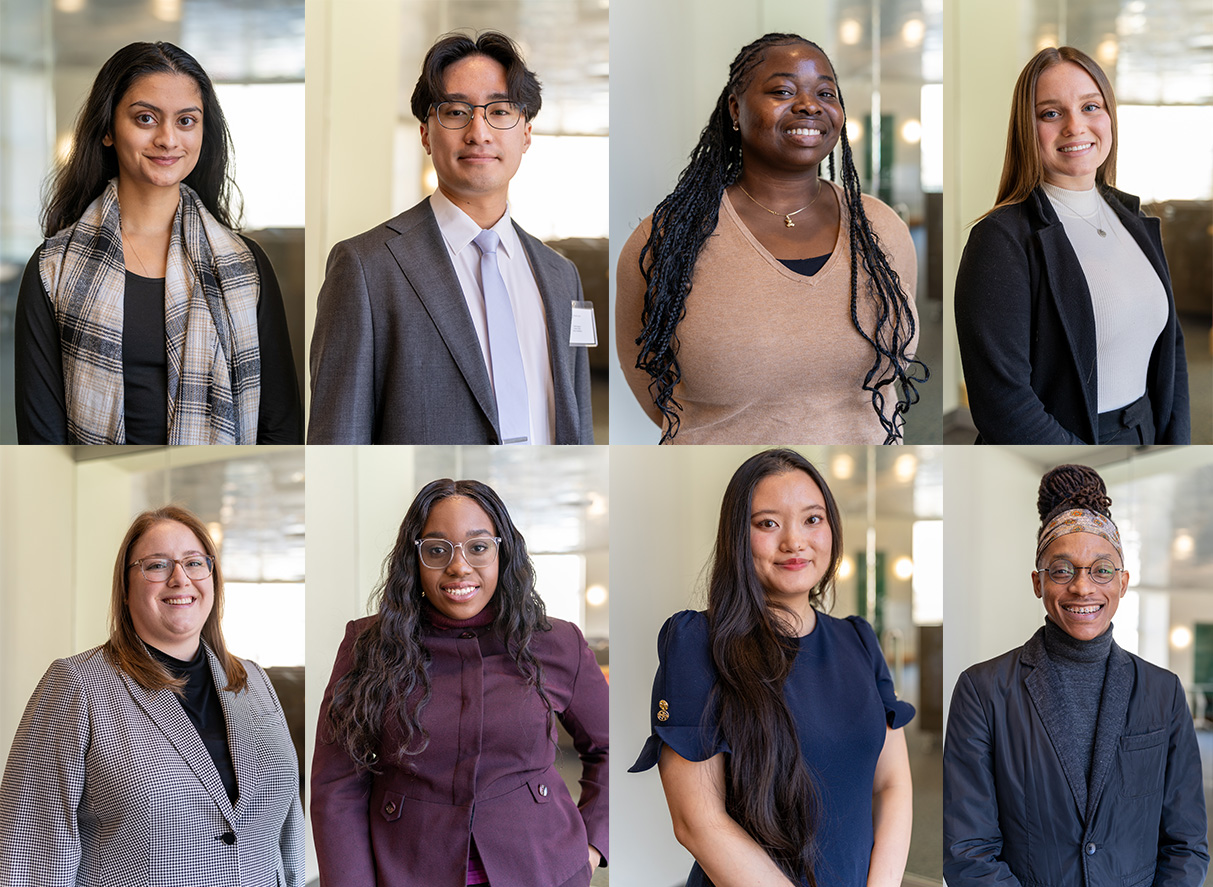Students Research GenAI’s Potential Impact at UMB
February 05, 2025 Angela Jackson
The 2025 cohort of the President’s Symposium and White Paper Project is tackling the future of generative artificial intelligence at the University. A panel discussion will be held Feb. 18.
Photo: The 2025 cohort of the President’s Fellows are students (from top left to right) Devina Chatterjee, Andrew Nguyen, Oreoluwa Olaniyan, Raina Crew; (from bottom left to right) Dorothy Veron, Onyemauchechukwu Ijezie, Margaret Kim, and David Robertson. Photo by Angela Jackson
It was either Alan Turin and his famed "Turing Test" or Marvin Minsky's work at the Massachusetts Institute of Technology who first planted the seeds of a world shaped by artificial intelligence (AI). Regardless of who deserves the credit, in the span of a few decades, the idea of machines that "learn" has gone from radical to routine. As algorithms grow more sophisticated and computational power expands, the gap between human innovation and AI-driven insight has steadily narrowed.
Recently, the conversation around AI has shifted toward a specialized branch known as generative AI (GenAI), which uses data to produce new content like text and images. Popular GenAI platforms like ChatGPT and Microsoft Copilot allow users to submit prompts that generate information on demand, be it a poem or a complex algorithm. As of December 2024, over 300 million people utilize GenAI weekly. According to a recent survey, this group includes one in five college students who admit to using AI for schoolwork.
The rapid emergence and adoption of GenAI in academic settings has raised questions about its role in higher education. While some worry these tools undermine academic integrity, others view them as partners that help students and faculty overcome academic barriers. Whatever one's stance, GenAI is no fad. Its influence is expanding in higher education and across the professional fields that the University of Maryland, Baltimore (UMB) serves.
This pressing reality is why the 2025 President's Symposium and White Paper Project is centered on GenAI's impact on the academic environment at UMB. A cohort of eight students from across the University, known as President's Fellows, has been selected to help shape the University's future. The fellows will interview University leadership and consult internal and external experts to investigate GenAI's benefits and pitfalls for teaching and learning. Their research will culminate in a white paper and campuswide presentation with recommendations on how UMB can responsibly integrate GenAI into academics.
GenAI has already played a pivotal role in many of the fellows' careers. Andrew Nguyen, a student at the University of Maryland School of Medicine (UMSOM), experienced the power of AI while working in a research lab before attending UMB.
"I watched AI diagnose heart disease in seconds — it was really beautiful," Nguyen recalls. "What's inspiring as a medical student is continuing to discover all these new, diverse AI tools for students and professionals. As a President's Fellow, I hope to inspect how they can positively transform our studying and how we treat patients."
For others, like Dorothy Veron, a student at the University of Maryland Francis King Carey School of Law, being a President's Fellow fulfills a longstanding passion for innovation. Before attending Maryland Carey Law, Vernon worked in Student Affairs, driven by a belief in students' potential to create and shape the future.
"Now, as a law student, my focus is on innovation, creativity, and intellectual property," Veron explains. "We're at a crossroads with AI, and it's exciting to collaborate with a diverse group of peers to propose solutions, tackle challenges, and help launch new initiatives for the University."
The 2025 President's Fellows are Devina Chatterjee, MD student, UMSOM; Raina Crew, MSW student, University of Maryland School of Social Work; Onyemauchechukwu Ijezie, PharmD student, University of Maryland School of Pharmacy; Margaret Kim, DDS student, University of Maryland School of Dentistry; Andrew Nguyen, MD student, UMSOM; Oreoluwa Olaniyan, BSN student, University of Maryland School of Nursing; David Robertson, PhD student, University of Maryland School of Graduate Studies; and Dorothy Veron, Maryland Carey Law.
Guided by Intercultural Leadership and Engagement and their faculty advisor, Isabell May, PhD, associate professor, University of Maryland School of Graduate Studies, and director, UMB Writing Center, the fellows will host symposium sessions throughout the spring 2025 semester. These events will feature panel discussions about GenAI's impact across faculty, students, and the curriculum, along with demonstrations of responsible GenAI use. The first event, "AI at UMB: Exploring the Present and Preparing for the Future," will be on Tuesday, Feb. 18, and is open for registration.
Ultimately, this year's symposium aims to help UMB foster an environment where students and faculty can harness AI as a springboard for innovation without sacrificing the pursuit of knowledge and the University's core value of Respect and Integrity.
For more information about the President's Symposium and White Paper Project, visit the program's webpage.